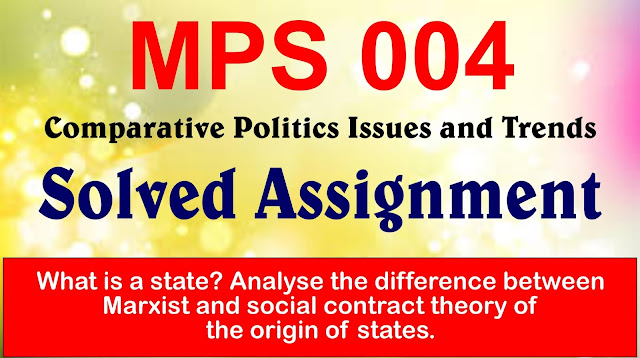Marxist and Social Contract Theory of the Origin of States
What is State
A state is quite a government; that's clear. Governments
change, but states endure. A state is that the means of rule over an outlined
or "sovereign" territory. it's comprised of an executive, a
bureaucracy, courts and other institutions. But, above all, a state levies
taxes and operates a military and police . States distribute and re-distribute
resources and wealth, so lobbyists, politicians and revolutionaries seek in
their own thanks to influence or maybe to urge hold of the levers of state
power. States exist during a sort of sizes, starting from enormous China to
tiny Andorra. Some claim an extended lineage, while others are of recent
construction. altogether but the short term, states are in flux.
They expand and contract as military and political fortunes
change. Some, like Poland, even disappear and re-appear later. Or they'll be
divided (sometimes peacefully) by communities that like better to go their
separate ways (Czechoslovakia). Others, like Iraq, could also be occupied or
run as a colony or protectorate. States also can "fail" - their
governing institutions collapse thanks to war and internal strife (as in
Somalia) or because the state has little authority outside the capital city
(Afghanistan). While globalization and regional integration (like the ecu Union)
challenge the state's powers, the state remains the dominant arena of domestic
politics also because the primary actor in diplomacy .
Marxist Theory of State
Marxist theory of state, besides liberal state, is probably
the foremost prominent theory. Marxist theory not only challenges the essential
concepts of liberal state but also emphasises that it enslaves majority men of
society for the realisation of its aims, it's to be abolished or smashed
without which the emancipation of common men will never be possible. However, a
drag about academic analysis of Marxist theory of state is that no where Marx
has methodically analysed the idea .
Marx (1818- 1883) and his friend Engels (1820-1895) have made
different comments and statements which constitute the material of state
theory. We shall first affect the definition of state. within the Communist
Manifesto (it was written by both Marx and Engels) we discover an easy
definition of state.
They have said that the state is that the “Political power,
properly so called, is simply the organised power of 1 class for oppressing
another”. within the same book we discover them saying, “The executive of the
fashionable state is but a committee for managing the common affairs of the
entire bourgeoisie”.
Hal Draper in his Karl Marx’s Theory of Revolution defines
within the following words: “The state is that the institution or complex of
institutions which bases itself on the supply of forcible coercion by special
agencies of society so as to take care of the dominance of a upper class ,
preserve the prevailing property relations from basic change and keep all other
classes in subjection.”
Manifesto and German Ideology
In many of their writings Marx and Engels have elaborated the
instrumentalist idea of state but analysts of Marxism are of opinion that
within the Communist Manifesto (full name is Manifest of the Communist Party)
and therefore the German Ideology the concept has prominence. The bourgeois
class gradually and steadily captured political power and eventually
established its authority over all aspects of governmental affairs.
In Manifesto Marx and
Engels have said, “political power, properly so called, is simply the organised
power of 1 class for oppressing another”.
The bourgeoisie, so as to determine its full control over the
industry especially and therefore the economy generally , has constantly
revolutionised the industry, mode of production. The bourgeoisie did it by
introducing new machineries and improved techniques of production into
industries. By doing this the capitalist class has been ready to articulate its
full hold over all the branches of economy.
The bourgeoisie has not only controlled the domestic economy
and internal market but also the planet market. “The bourgeoisie has through
its exploitation of the planet market given a cosmopolitan character to
production and consumption”.
In other words, the chief aim of the bourgeoisie is to
regulate all the branches of state , the economy with all its ramifications and
eventually the planet market. Marx and Engels have assertively said that the
bourgeoisie has performed these tasks through state and during this way the
state acts as an instrument.
The State and therefore the Ideology
Though Marx and Engels have viewed the state from the
background of materialism, they need never overlooked the ideological aspect of
state. The ideology or ideas play a really vital role within the management of
state. within the German Ideology Marx and Engels have stressed the purpose
that in every class state the dominant class always dominants the economic,
political, cultural and other aspects of state.
This doesn't mean that the state will always represent a
specific ideology. However, the state will represent the views and concepts of
the economically dominant class. allow us to quote from The German Ideology an
outsized passage:
“The ideas of the upper class are in every epoch the ruling
ideas, i.e. the category which is that the ruling the fabric force of society
is at an equivalent time its ruling intellectual force. the category which has
the means of fabric production at its disposal, consequently also controls the
means of mental production in order that the ideas of these who lacks the means
of mental production are on the entire subject thereto . The ruling ideas are
nothing quite the perfect expression of the dominant material relations”.
WhatsApp Contact : 8130208920









